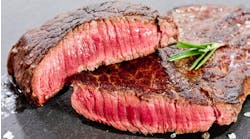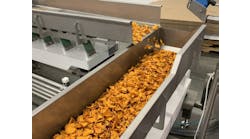The Wall Street Journal, no less, took notice of a new food sterilization technique on the first page of its Feb. 17 Marketplace section. While copyright prevents us from giving you the full, unabridged Journal story, here are its highlights:Hormel Foods Corp., Perdue Farms Inc. and others are dunking prewrapped foods into tanks of pressurized water -- a process that kills salmonella, E. coli and listeria and allows food makers to add fewer preservatives. It also enables vendors to keep deli ham, pre-cooked chicken strips and other meats in the food pipeline a lot longer. Hormel says its lunch meat now lasts for as long as 100 days -- more than twice as long as before, the Journal reported.The pressurizing machines are made by Avure Technologies, a Kent, Wash., subsidiary of Flow Technologies Inc. Avure calls them high-pressure processing (HPP) units and markets them under its trademarked name Fresher Under Pressure.The units are a little pricey -- starting at $600,000 and costing as much as $2 million each. Nevertheless, they’re getting a look from some processors. For instance, Hormel Foods, Austin, Minn., last fall started pressurizing the deli meat it sells to restaurants and cafeterias. Workers stack slabs of meat in metal cages that they lower into massive cannon-like tanks at the company's Iowa and Minnesota processing plants. The water in the tanks can be made to exert as much as 87,000 pounds per square inch of pressure on the meat -- roughly equivalent to that exerted by three elephants standing on a dime, the Journal reported.The pressure kills bacteria by disrupting cell functions. But the food stays intact because the machines exert the pressure equally on all sides. Hormel says its consumer tasting panels think the pressurized meat tastes better than the non-pressurized type, the Journal said.However, there is not universal agreement on the practicality of the process. The Journal also reported that ConAgra Foods Inc., Omaha, Neb., maker of Healthy Choice and Butterball deli meats, tested the process three years ago and decided against it. ConAgra said its consumer testers thought the pressurized meat lacked the expected rubbery texture of lunch meat. The company also was disappointed when the process only moderately extended the shelf life of its meat; it had hoped the pressurized meat would last at least nine months.Nevertheless, optimistic about the process and buoyed by the Journal story, Pat Adams, president & CEO of Avure Technologies, told us the first contract HPP pasteurization center in North America opened in Milwaukee in January. “It is owned by the ex-president of Emmpak meats, Justin Segal, and several senior executives from the food industry. This now enables processors to have immediate access to test-market new HPP product lines, provides overflow capacity for in-house HPP operations and provides permanent availability for companies that do not want to operate their own system or that use co-packers for producing their products.” Contact Adams at 253-813-2712 or see www.avure.com.
Latest from Plant Operations and Engineering
Latest from Plant Operations and Engineering

